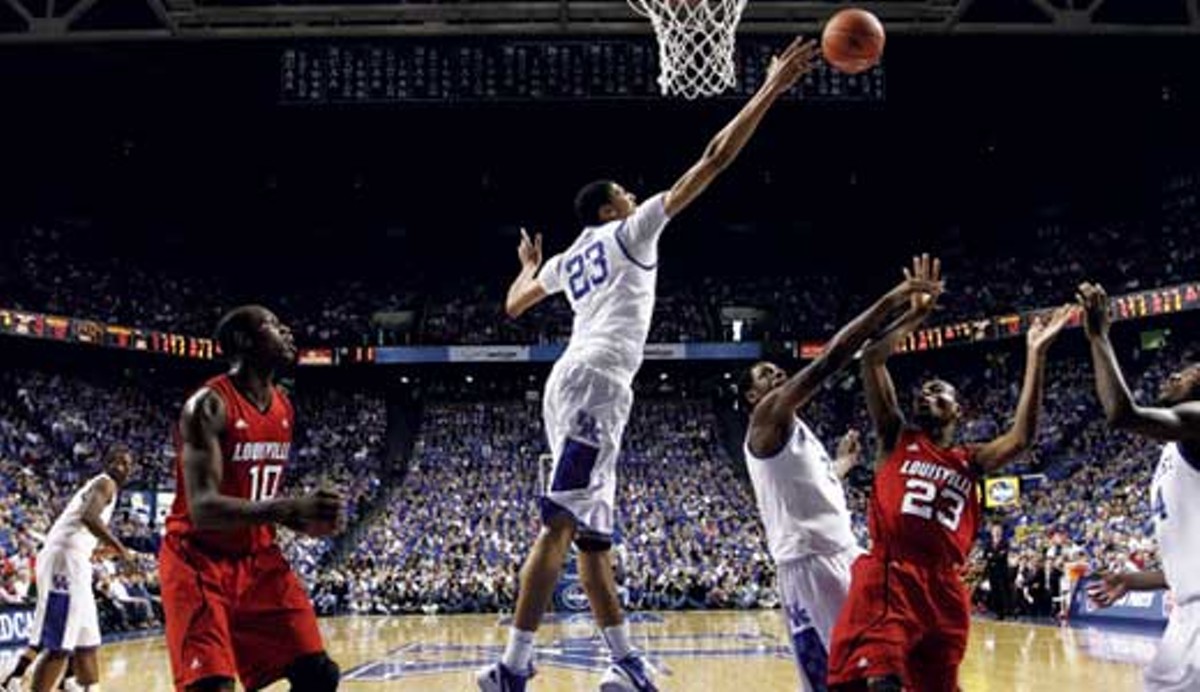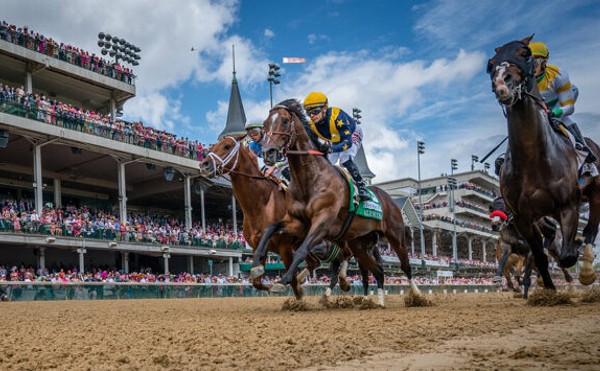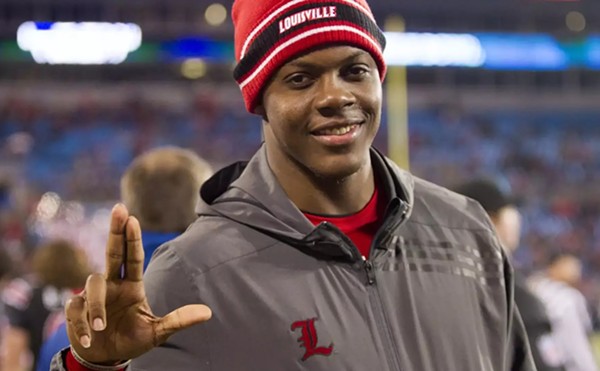John Calipari, who can’t coach, pulled his freshman point guard Marquis Teague aside one day early in the season. He’s had a run of freshman point guards — I’m sure you’ve heard — in recent years. Drawing on his experience of coaching point guard savants like John Wall and Derrick Rose, Calipari looked at Teague and, in so many words, said: “Get out of the way.”
That’s what Calipari does with a stable of athletes unrivaled in college athletics that, when given a basketball, can do things few others can. So that’s what Calipari did. He gave them a basketball and said, “Do basketball things,” and when they did, Cal — the recruiter — was competent enough to see that Teague was the one gumming up the works. He was good, sure — McDonald’s All-American, big brother in the NBA — but he was The One Who Would Ruin It All.
Anyone could see that. Still, if you’re the weakest link on a team full of superstars, aren’t you still a superstar? Hell, after a November loss to Kentucky, Kansas senior point guard Tyshawn Taylor couldn’t help but gush about the talented young Wildcats.
“Really, really, really talented one through seven. Two or three games in, they’re going to be really, really good once they get more practice and more reps,” Taylor said in November. “A lot of the guys are young still. I think they’re going to be amazing.”
But there was still this problem. They were good, Calipari knew, but they should be better. He’d stammer in press conferences about youth and learning, but who were they going to learn from? Surely not the guy hell-bent on making recruiting inroads. No, Coach Cal just wants to be seen with Jay-Z so high school kids will think he’s cool and make their one-year stop at Kentucky on the way to the NBA. He couldn’t teach them anything.
So there was Teague in the early season, floundering away — dribbling into traffic, firing bad shots, turning the ball over — you know, all the things bad point guards do. Until one day, Teague looked around, and Calipari’s directive began to sink in.
He saw Anthony Davis, a guy with Inspector Gadget arms who was, if you haven’t heard, a high school point guard who shot up to nearly 7-feet tall a few years back. He saw Terrence Jones, who could have been a lottery pick in last year’s NBA draft. He saw Doron Lamb, a sophomore slasher shooting nearly 50 percent from three. He saw Darius Miller, a senior who probably looked really old to him. He saw Kyle Wiltjer, a smooth-shooting freshman who would start almost anywhere else in the country. He saw Michael Kidd-Gilchrist, a blue chip recruit who plays like there’s a jetpack up his ass.
So Teague learned. But not in the traditional sense, because in order to “learn” you must have a teacher, and we all know Calipari can’t teach. And so he watched:
Here’s Anthony Davis, who blocks and dunks and makes outside jump shots. So revered by opposing coaches in the Southeastern Conference was Davis that he was named conference Freshman of the Year, Defensive Player of the Year, and overall Player of the Year. Sure it’s the SEC, where basketball takes a backseat to football and red shorts with lobsters stitched on them, but an impressive achievement, no less. How hard is it to be an effective point guard with that thing roaming around under the basket?
But when defenses collapse in the post, Teague knows to look elsewhere, and, hey, there’s Michael Kidd-Gilchrist, a guy named the best high school player in the country after his junior year, who plays with an abandon typically reserved for combat. After Kidd-Gilchrist led Kentucky to a win over Louisville in December with 24 points and 19 rebounds, Rick Pitino said longingly: “He plays every possession like he’s going to die tomorrow.”
So Teague figured it out — on his own, of course, or maybe his brother helped or something. Even so, it’s not rocket science, right? Come down the floor and let Davis or Kidd-Gilchrist or Lamb go to work; just don’t get in the way. But the weird thing was, the more Teague involved the other six guys, the better Teague got. And those other six guys were also improving, no thanks to that guy on the sideline.
But Teague scored more. He turned the ball over less. He shot better. He recognized that when guarded by someone like Vanderbilt’s Brad Tinsley — who is about as quick as the Commodore mascot — he could do whatever he wanted.
This recognition isn’t learned, but something ingrained in him. Clearly Teague figured out his own selfishness is inversely related to his success.
Could the rest of the team see that, though? What good is an unselfish Teague tethered to a selfish Terrence Jones, who was famously censured by Calipari last season for being selfish. What if Davis decides he wants more shots, or Lamb wants to re-establish his draft position, or Wiltjer and Miller want more minutes? Then what, Calipari?
But nothing of the sort has happened, for some reason not related to the coach, I’m sure. Kevin Stallings, Vanderbilt’s blustery head coach, who, by most accounts, does not much care for Kentucky, was even effusive in his praise.
“I like their team just from an opposing coaching standpoint because they try to play the right way, they aren’t out there running their mouths or doing things that I think are uncalled for and unsportsmanlike,” Stallings said last month. “They just play the game, they play hard, they play for each other, and I really respect that.”
So, again, these players fall in the lap of John Calipari, the guy who can’t coach, the guy whose players don’t play for him or their school but for their draft status, the guy who just recruits. He lucks his way into a 30-1 regular season record, an undefeated run through the SEC, and a No. 1 ranking. And now he’ll stand on his pulpit — its structure reinforced by the accomplishments of 18-year-olds — and he’ll shout down at the also-rans, the teams and coaches not fortunate enough to enjoy the success he ambles into. He’ll tell them where this Kentucky team is going, and that they need to get out of the way. And it’s probably best they listen.






